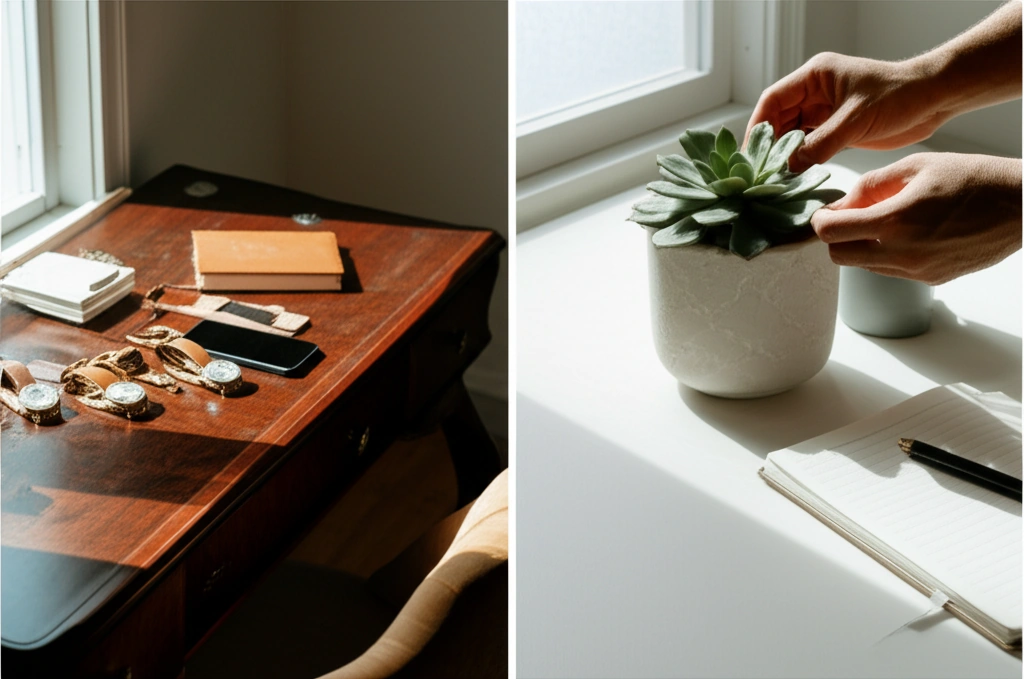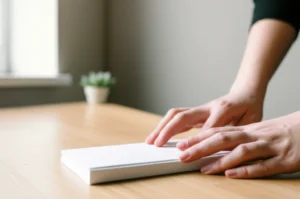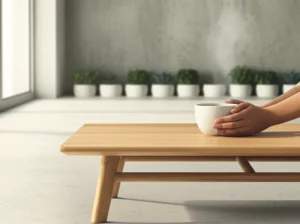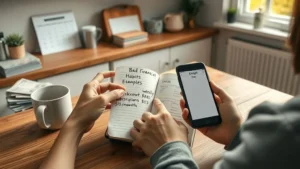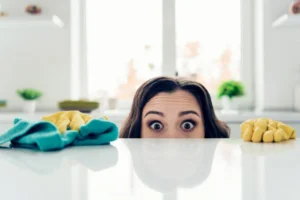Most people don’t realize that chasing after more and more stuff rarely leads to more happiness. But what if I told you there’s a different way to live—a path that lets you trade clutter for contentment and stress for space? Let’s crack open this debate: materialism vs minimalism. I want you to walk away with real answers, a little inspiration, and maybe—just maybe—a spark of curiosity to try something new.
So, why are we constantly told to buy the next big thing, when deep down, it never seems to be “enough”? What if less is, in fact, more? You’re about to find out—without getting lectured or bored by textbook definitions, promise! We’ll look at experiences, science, the downsides of each lifestyle, and some honest stories (mess and all) to help you figure out where you fit in the tug-of-war of stuff.
Defining The Two Lifestyles
Let’s face it: “materialism” and “minimalism” get thrown around a lot these days. But what do they actually mean in real, everyday life?
Materialism: More Than Just Stuff
Materialism isn’t only about hoarding gadgets and designer labels. At its heart, materialism means putting the highest value on things—believing possessions can bring lasting happiness, even define who we are. It can show up as working non-stop for a bigger house, always needing the latest phone, or feeling a rush when online shopping carts hit the checkout. We’ve all been there! Whether it’s for comfort, status, or fitting in, materialism whispers that more is always better.
Minimalism: Simple, But Not Boring
On the flip side, there’s minimalism. Now, minimalism isn’t just getting rid of all your stuff and living in a white-walled, empty apartment. That’s an extreme stereotype! The true minimalism lifestyle definition puts the focus on living with intention—owning only what you love or truly need and saying goodbye to the rest. It’s about making space, not just physically but mentally and emotionally, for what actually matters.
For some, that’s a cleared-out closet or a smaller home. For others, it’s carving out time for passion projects, close friends, or experiences that spark joy (maybe it’s spontaneous road trips or trying new recipes together, instead of buying another kitchen gadget).
Are Materialism And Minimalism Opposites?
Here’s a weird twist—sometimes, our obsession with “doing minimalism right” can actually sneak into materialistic territory! Ever felt pressured to have the perfect capsule wardrobe or the trendiest, clutter-free living room? You’re not alone. Even minimalism can turn into another way we chase status or satisfaction if it becomes all about showing off, not about why we’re choosing less. At the end of the day, what matters is your motivation, not just your number of possessions.
What The Research Says
You might be surprised to hear that science has a lot to say about all this. Much more than just Instagram trends, these lifestyles show up in real research—and what folks have found might change how you think about your own stuff.
Minimalism And Well-being: The Benefits Backed By Science
A recent study explored why minimalism is catching on, especially with younger generations. It turns out, the reasons go beyond “just wanting to declutter.” Environmental worries, the joy of sharing resources (like using community libraries or car-shares), and seeking out simplicity all play a role. Most interesting? Researchers found a real link between adopting minimalist habits and boosted well-being—not just because you have less stuff, but thanks to a deep sense of fulfillment that grows when you live by your values and make space for what countsaccording to one study.
If you want to go deeper into the growing science on this, check out this easy-to-read research on minimalism that breaks down fresh studies, from decluttering’s effect on mood to how minimalism influences daily choices.
Materialism And Its Side Effects
But what about materialism? Does buying more really make us happier? Research from psychologists like Daniel Kahneman uncovered something fascinating: happiness does go up with income and possessions, but only to a point. Beyond having basic needs met, stacking up more “stuff” or money leads to diminishing returns—and sometimes, even more stress, social comparison, and anxietyaccording to these findings. It’s that classic case of “new car smell” happiness that fades fast.
Why Minimalism Feels So Good (And Sometimes Hard)
Mental And Emotional Boosts
Ever walked into a room after finally tidying up and felt like you could breathe again? That’s the magic minimalism taps into. Less clutter = less mental “noise.” Minimalist living often means clearer thinking, less decision fatigue (“what do I wear?!”), and an easier time focusing on what makes you feel alive—which, let’s be honest, is rarely the box of cables you’ve been meaning to sort through since 2019.
The positive effects aren’t just in your head, either. Minimalist choices free up time and money—suddenly there’s room for travel, hobbies, or lazy brunches with friends instead of endless cleaning or shopping. There’s even research suggesting that shedding excess stuff can give your mood a serious boostminimalism and mental health.
Practical And Financial Perks
Want a smaller rent bill or to finally tame that wild storage closet? Minimalism is your friend. By sticking to needs and what genuinely adds value, folks often find themselves saving hundreds (if not thousands) each year. Less stuff to buy, store, clean, and fix means more resources for things you actually want to do—and less guilt when a spontaneous adventure calls.
Social Gains
Minimalism can bring people closer together. When you’re not constantly distracted by shopping lists or to-dos, you have more energy for real connections: spontaneous conversations, board game nights, or simply being present without multitasking. It’s about connection over consumption, memories over merchandise.
The Disadvantages Of Minimalism (Yes, They Exist)
Here’s the thing: minimalism is not all sunshine and perfectly curated shelves. Let’s get real for a second about the disadvantages of minimalism.
When Minimalism Tips Too Far
It can turn obsessive—a rabbit hole of “am I minimalist enough?” If you’ve ever agonized about keeping a sentimental trinket or felt anxious in a sparse apartment, you know what I’m talking about. For some, rigid minimalism can bring guilt (“I failed because I bought a new sweater”) or even isolation, especially if your social group bonds over shopping or gift-giving.
Real-Life Friction
Going minimalist can ruffle feathers. Friends and family may feel awkward if you politely decline gifts, or they might (wrongly) assume you’re judging their choices. There are practical challenges too—sometimes, extremes lead to getting rid of things you later desperately miss (ever needed an umbrella at the wrong moment?) or make daily life less convenient.
Minimalism also isn’t a fix for underlying mental health struggles. It can help create a peaceful environment, yes, but happiness depends on much more than a tidy shelf. If you’re curious about the nuances or the latest science, this resource on minimalism and mental health is a must-read.
Don’t Forget: Minimalism Means Different Things To Everyone
Your version of “enough” won’t be the same as your best friend’s. The magic happens when you find what works for you, not when you follow a rigid trend. Some people thrive with a minimal wardrobe; others need a closet full of quirky sweaters for cold mornings.
The Highs And Lows Of Materialism
When Materialism Hurts
Let’s not sugarcoat it: high materialism often brings baggage. Studies link it to more debt, less gratitude, and a nasty habit of comparing ourselves to others. That “keeping up with the Joneses” feeling? It’s exhausting and rarely rewarding. The social media highlight-reel only makes it worse, feeding envy and a sense of “not enough.”
Environmentally, materialism’s appetite is huge. More stuff means more waste, higher carbon footprints, and a planet under pressure. It’s a real cycle: buy more, need more space, use more resources, repeat.
But—Let’s Be Fair—Material Things Can Matter
Material comforts play a real role in life. A soft sofa, a reliable phone, or a sturdy pair of boots can make everyday life easier and sometimes safer. Cultural traditions, family heirlooms, or simple joys like a favorite mug all add meaning. Materialism only becomes a problem when the search for “more” overtakes what really matters—connection, purpose, and your own peace of mind.
Which Path Fits You?
Wondering where you land on the spectrum of materialism vs minimalism? Here’s a quick comparison to chew on:
| Aspect | Materialism | Minimalism |
|---|---|---|
| Focus | Things & possessions | Experiences & values |
| Spending | More frequent purchases, upgrades | Fewer, intentional buys |
| Emotional Impact | Short-term happiness, comparison, debt risk | Lower stress, more satisfaction—if done mindfully |
| Downsides | Clutter, stress, environmental impact | Guilt, inconvenience, social pushback if extreme |
Here’s a little challenge: next week, try asking yourself with each purchase, “Does this bring lasting value or just a quick hit of pleasure?” Test out a mini-experiment. Maybe set a limit—no non-essential buys for seven days—or swap a shopping trip for an experience.
Finding Your Own Balance
Simple Principles For Thoughtful Living
You don’t have to go all-in minimalist or toss every comfort to the curb. Balance means checking your motivations and priorities once in a while. Quality over quantity. Purpose over pressure. “Enough” is a decision only you can make—and it might change with seasons or life circumstances.
Easy Experiments To Try
- Declutter one drawer or shelf—not your whole home. See how it feels.
- Before any purchase, use the 24-hour rule: wait a day, then decide if you really want it.
- If minimalism sounds appealing but intense, try a “one in, one out” policy for clothes or gadgets.
- List 3 experiences (not things) you’d rather pay for this month and make at least one happen.
Real Talk: You’re Not Alone In Figuring This Out
There’s no gold star for owning the least or the fanciest. Most of us zig-zag between wanting new things and craving less chaos. That’s okay. These days, more folks are sharing their honest journeys—failures, restarts, and small wins. If you want an extra dose of insight, poke around research on minimalism to see how others are navigating the balance.
Maybe today you need simplicity. Tomorrow, a little “treat yourself” is exactly right. The only mistake is letting someone else’s rules drown out your own needs and happiness.
Ready To Try Less For Yourself?
Hey, there’s nothing wrong with loving things that actually add value to your life. But if you’ve ever felt smothered by your stuff, exhausted by stress shopping, or just want to try a new way of being—it’s worth exploring minimalism. Don’t feel like you have to ditch everything or become a monk. Even small steps can clear space for bigger joys, relationships, and true contentment.
How about it? Are you tempted to experiment with “less is more”? What little changes could you try this week? Maybe you’ve got your own stories or questions about minimalism vs materialism—don’t hesitate to share them or start a conversation. Sometimes, the smallest shift leads to the biggest changes.
Thanks for hanging out with me (and for embracing a little friendly honesty about our messy lives). Remember: you’re in the driver’s seat—and less might just feel a whole lot like more.

